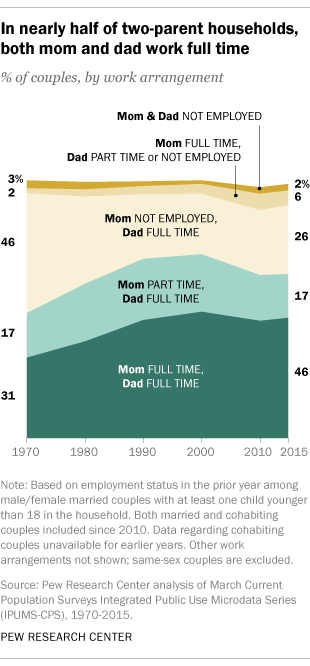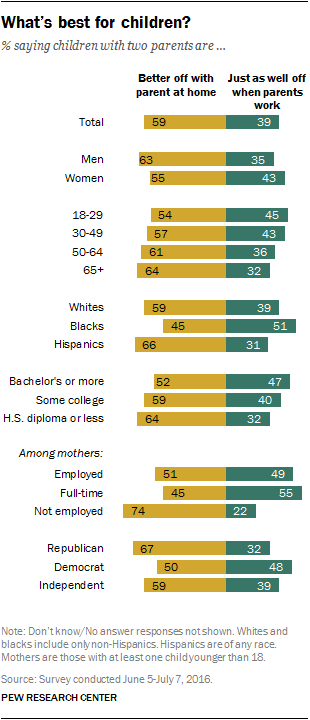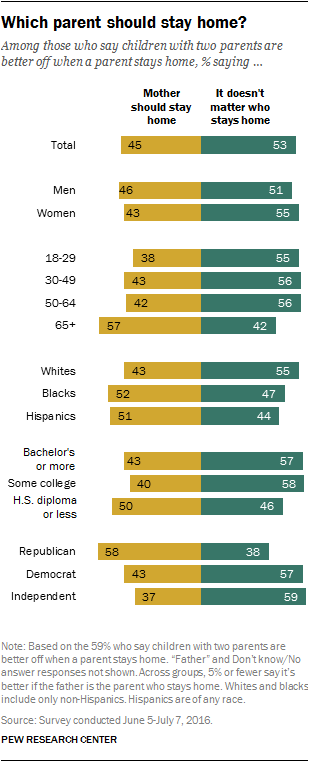
In nearly half of two-parent households in the U.S. today, children are raised by parents who both work full time. Yet most Americans say that children with two parents are better off when one of them stays home to tend to the family, according to a Pew Research Center survey.
The survey, conducted June 7-July 5 among 4,602 adults on Pew Research Center’s nationally representative American Trends Panel, found that 59% of U.S. adults believe that children with two parents are better off when a parent stays home, while about four-in-ten (39%) say children are just as well off when their parents work outside the home.
A Pew Research Center analysis conducted last year had found that both parents work full time in 46% of two-parent households. By contrast, in 1970, only 31% of these households had both parents employed full time. The most common arrangement at that time, among two-parent households, was a full-time working father and a mother who was not employed.

Among those who think children are better off with a parent at home, about 53% say it doesn’t matter which one stays home, while 45% say it’s better if the mother is the parent who isn’t employed outside the home. Just 2% say it’s better if the father is the parent who stays home.
Men are more likely than women to say that children in two-parent households are better off when a parent stays home (63% vs. 55%). But among those who think a parent should stay home, roughly similar shares of men (46%) and women (43%) say this parent should be the mother.
The view that children are better off when one parent doesn’t work outside the home is particularly common among older Americans. But even among those under age 30, fully 54% hold this view. And younger men are far more likely than younger women to say children are better off with a parent at home (62% vs. 46%).
Blacks are less likely than whites and Hispanics to say that children are better off with a parent staying home. Some 45% of blacks believe that children are better off when a parent stays home. About six-in-ten whites (59%) and two-thirds of Hispanics (66%) feel this way.

Views on this question also vary by education. About half of college graduates (52%) say it’s better for children to have a parent staying home, compared with 59% of those with some college experience and 64% of those with a high school education or less.
Most women with children under age 18 work outside the home today: In 2015, about half of mothers worked full time and an additional 16% worked part time, according to data from the Bureau of Labor Statistics. Among all mothers with children under 18, views about what’s best for children diverge sharply by employment status. About half (51%) of employed mothers – and just 45% of those who are employed full time – think children in two-parent households are better off when one parent stays home. In contrast, roughly three-quarters (74%) of mothers with children under 18 who are not employed think that children are better off when a parent stays at home.
Partisan divides are evident in these attitudes as well. Two-thirds of Republicans (67%) believe that children are better off when a parent stays home, compared with 50% of Democrats and 59% of independents. And, among those who say it’s better for children to have a parent at home, Republicans are more likely than Democrats and independents to say that parent should be the mother (58% vs. 43% and 37%, respectively).
Older adults also are more likely than their younger counterparts to say that the parent staying home should be the mother. Among those ages 65 and older who think it’s best if a parent stays home, 57% say it’s better if this parent is the mother, while 42% say it doesn’t matter which parent stays home. In contrast, those in younger age groups are more likely to say it doesn’t matter which parent stays home than they are to say the mother should be the at-home parent.
And while about six-in-ten Americans with a college degree (57%) or with some college experience (58%) who believe children are better off when a parent doesn’t work outside the home say it doesn’t matter which parent stays home, those with a high school education or less are more evenly divided. Half of those who didn’t attend college say the mother should stay home, while about as many (46%) say it doesn’t matter which parent stays home.
Note: Full methodology and topline are available here.
